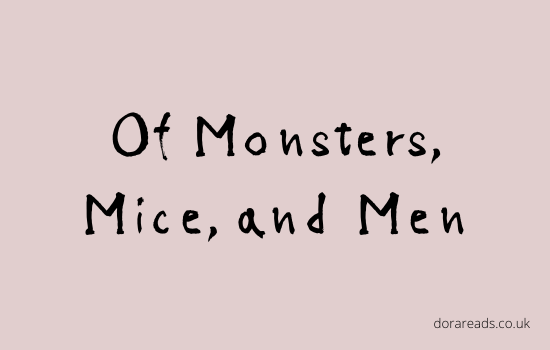'Monsters exist, but they are too few in number to be truly dangerous. More dangerous are the common men, the functionaries ready to believe and to act without asking questions.'
- Holocaust survivor Primo Levi


Warning: this post discusses the Holocaust, Nazis, and related topics.

On January 27th 1945, Auschwitz was liberated.
January 27th is now Holocaust Memorial Day.
In January 2022, a Tennessee school district banned the Holocaust graphic novel/memoir Maus by Art Spiegelman.
Maus, regarded by many as a modern classic and an example of the artistry and story-telling capabilities of graphic novels, is a book which depicts Jewish people as mice, and the Nazis as cats.
The banning of Maus follows a general trend of book-banning in the USA over recent months.
I'm happy to say that sales of Maus have soared in the wake of the banning.

I had originally started to write an entirely different blogpost for this week's Nerd Church, on an entirely different topic.
But it wasn't coming together.
There are a lot of reasons for that - I never have one reason for anything, after all - and one day I may end up finishing the post I was working on.
Mostly, though, I think it wasn't coming together because it wasn't the post I wanted to write.
More than that, it wasn't the post that wanted to be written.
This post - this one, right here, that you're reading - was one that'd been lurking in the back of my head for a while, but I'd written similar posts about the Holocaust before, and wasn't sure I had anything more to add, or that anyone would want to read yet another post by me on this topic.
But the universe - well, the universe wanted me to write this.
The universe was like, 'if I send you any more signs, you'll be legally obliged to become a part of The Highway Code - Write. The. Thing.'
So here I am. And here we are. I hope I do this justice.

The 'monsters' quote from Primo Levi, which opens this post, also opens a documentary film called The Final Account.
The Final Account is not an easy watch - but it's an important one. Because history doesn't care about whether something is comfortable.
This film shows interviews - compiled over around a decade's worth of filming - with everyday people who were involved with the Nazi regime.
That sounds like an impossibility, doesn't it? Everyday people involved with the Nazi regime... doesn't seem quite real.
But it is.
These are the children of the Hitler Youth.
....The people who lived in villages next to concentration camps
...The people who worked with concentration camp prisoners when they were hired out in labour teams
...The members of Germany's armed forces. Including SS officers.
Those who speak in The Final Account are elderly and sometimes frail - hence the importance of these interviews from film-maker Luke Holland, himself the direct descendant of Holocaust victims.
These people are a living link to that time
- and this may be the last chance to speak to those who saw the way the regime worked in daily life, who can testify as to what the public did and did not know, who can explain how these horrible things were allowed to happen.
The accounts contradict each other on the topic of whether people knew what was happening to Jewish people, to disabled people, to politicial prisoners, to anyone who ended up in a concentration camp.
Many claim no-one knew anything. But those who say that... their accounts rarely ring true.
And other interviewees say outright that everyone knew - that people were scared that it would happen to them and so stayed quiet, or else simply didn't care at all. Some are ashamed at their own apathy.
They say that anyone who claims they didn't know is lying.
You can see the trailer for The Final Account below:
Warning: flashing images, Nazi imagery
German with English subtitles; 1.40 mins
Interspersed with the interviews are historical footage and photographs - much of which is of smiling children.
Smiling children wearing Hitler Youth uniforms. Smiling children making Nazi salutes. Smiling children hoisting a swastika up a flag pole.
It's chilling.
And it made me think of Taika Waititi's film Jojo Rabbit
- a film which I've written about a lot before because it's amazing -
and that these boys and girls were the real versions of Jojo and his friends: taught to hate at the same times as being taught to read.
Quite literally - as one of the interviewees in The Final Account explains, they had two alphabet books: one was the regular animals and objects type that we'd all be familiar with, the other had a grotesque anti-Semitic caricature for each letter.
Related Posts:

The book Ausländer by Paul Dowswell follows Piotr, later renamed Peter, a Polish orphan of German descent who is 'reclaimed' by Germany after the invasion of Poland, and sent to be adopted by a Nazi family in Berlin.
This is not a perfect book, and relies heavily on Peter's rebellious streak, willingness to resist, and Polish background, to make clear that he isn't really a Nazi.
But I have to point out that the 'perfect book' doesn't exist, and this book does the job it gives itself - dropping a foreigner (an 'Ausländer') into Nazi Germany and forcing him to find his way in this world - very well.
At one point, Peter goes to the library - a place he uses as a kind of refuge from his Nazi guardians - and asks for a book he remembers reading years before.
But the librarian informs him, in terms of the strongest disdain and prejudice, that they don't carry books by Polish authors.
Nothing about the content. Nothing about the book itself. They don't carry books by Eastern European authors - because of their ethnicity.
Where Ausländer is strongest is in the moments where Peter feels uncomfortable - but does not speak up.
The family who takes him in are through-and-through Nazis.
Enough to give Peter whiplash between his guardian's attitudes and gentleness towards his children, and that same guardian's extreme views on racial purity and the regime as a whole.
He is surrounded - in a country where he is already viewed with suspicion because of his Polish background - by Nazis. Who would turn him in in a heartbeat if he does not show himself to be truly with the regime.
There are situations where Peter does not speak, does not contradict the hatred that surrounds him - because it's dangerous. His survival depends on keeping his mouth shut.
Can we blame him for that?
Can we blame any of them - the real boys and girls growing up in this situation, the real men and women trying to live their lives in the middle of this regime - for that?
Maybe we should blame them, I don't know. The magnitude of that time period - of those events - is often too difficult to navigate in terms of morality. As far as I'm concerned, anyway.
Because could any of us truly know - with 100% certainty - that we wouldn't stay quiet too?
Don't get me wrong - some cases are clearly cut-and-dried, right-and-wrong.
But the regular German citizens and residents? The 'common men'? In so many cases, there's just too much grey area there.

But... then there's also the people who supported the Nazis. Through and through.
Like one of the SS officers in The Final Account who... he appears to be a harmless old man. He does. You would pass him in the street and think nothing of it. I promise.
Until he opens his mouth, and very calmly repeats his faith in Hitler and the party...
- and says that the Nuremberg trials (which heard cases of war crimes and crimes against humanity against the regime,) weren't German law, so he does not accept their verdict on the SS as a criminal organisation...
- and says that though he wouldn't have gone as far as murdering Jewish people, they should've been driven out of Germany and sent somewhere else
- and says that the numbers killed in the Holocaust are exaggerated because it's 'the Jew' who gives us these numbers.
Those were 'regular,' 'normal,' people too. At least in Nazi Germany.
- Worse than that, they were seen as the best of citizens.
There are only a few monsters.
But give them enough 'common men' to enable them...
The Holocaust was made of hatred - but not only hatred.
Apathy, denialism, a blind trust in authority and maintaining the status quo... all of these things allowed hatred to grow and breed and thrive.
The normalised and casual anti-Semitism (amongst all the other types of bigotry on display) that became an everyday part of the lives of German people meant that few were interested enough - few cared enough - to ask any difficult questions.
Once you normalise hatred, normalise the systemic structures of hatred and genocide, people just... let it happen.
Another SS officer, Hans Werk, spoke about his shame and grief and disgust at the Nazi regime.
He speaks to a group of young men, during the course of the film, at the place where The Final Solution (the Holocaust - the genocide,) was hashed out.
These young men were extremists, or were in danger of being radicalised.
...Essentially, people heading down the road of fascism.
They argue that he is lying, that he is a traitor, that the Holocaust was not as bad as people claim.
And this former SS officer tells them, vehemently, that he - that all of the Nazis - were wrong. That he saw it. That he was there.
Many of them still didn't seem to believe him. And you can see the echo of those earlier young men, right there in the place where The Final Solution was planned.

Once you allow the idea that a particular group - or several particular groups - of people are 'unworthy of life,' or are, somehow, fundamentally a problem... who cares when those groups have their liberty slowly eroded?
Who cares when they are unable to marry the people they love? When the places they spend their leisure time are raided by the police? When they have to wear a symbol that marks them out as Other?
When their art - their literature - is seen as dangerous?
Does anyone hear their stories?
The Nazis did not seek only to eradicate the Jewish people - they also sought to eradicate the entirety of Jewish contributions to culture, science, art, and literature.

'The point is, it didn’t really matter what the book was about. It was what it meant that was important.'
- Markus Zusak, The Book Thief
The Book Thief by Markus Zusak is a modern classic that many people will be aware of.
If you haven't read it yet, I can't recommend it highly enough - it is beautiful and transcendant.
Though the heart of The Book Thief is people, it's also - as the name suggests - about books.
One of the pivotal moments of The Book Thief comes when our protaganist, a young girl named Liesel, steals three books from the remnants of a bonfire.
The books were written by 'enemies' of the Nazis - Jewish people, Communists, etc.
Book burning - and censorship in general - was seen as way for the Nazis to remove 'un-German' thoughts and ideas from circulation.
It was their way, or destruction.
Book burning was the regime's way of eradicating what they described as 'moral corruption.'
...They weren't the first group of people to use morality as an excuse to persecute and suppress the words of marginalised people. They certainly weren't the last.

I haven't yet read Maus.
But you can bet that I will (when I can get hold of a copy!)
Monsters exist. But they aren't the truly dangerous ones.
Related Reading:
A very eloquent post, Cee! I have read Maus and I can say that it was an extremely jarring, well-written, and well-crafted book. I don't see myself ever rereading it because it was a tough read for me. I don't read a lot of Holocaust literature because it usually really upsets me, but Maus is 100% worth the read.
ReplyDeleteThis post rings true because this weekend there has been a big anti-vax protest in Canada's capital. But a lot of the protestors are flying Nazi flags, including the daughter of my province's premier. And he hasn't denounced it once. Everyone has the right to protest, but when people are buying flags that represent one of the worst tragedies in history and passing it off as being concerned for their rights and freedoms, well it really angers me. I never thought I would see that in my country.
WTAF?! What is wrong with people?!
DeleteHere in the UK, in the summer of 2020, we ended up with a situation where some thugs were 'defending' a statue of Churchill from Black Lives Matter protestors, while making Nazi salutes. One of the many terrifying things about that is that they didn't see the irony.
Our Anti-vaxx a-holes have largely taken the step of referring to the government as Nazis, and have even gone so far as to wear yellow Stars of David to make out they're being persecuted. They've done that in France too. It's gross.
Argh, people! <3
Wow that quote seems so prescient given what's still happening today. I haven't read that GN but I heard about the ban thing. Also the Holocause denial/ white supremacist stuff that's been gaining traction here in America is sickening. I've often wondered- when that generation is no longer here to tell the story (and there are so few left)- will this stuff gain more traction? It's scary.
ReplyDeleteI don't want to say this lightly, because the Holocausr is of course an atrocity without equal, but many of us here are concerned about "common people" going along with some of the stuff here. It's like, where did these people come from?? I see dangerous trends here, with black flags flying in people's yards and whatnot.
I think it does honour to the victims of the Holocaust to be vigilent in our efforts to never let this happen again.
DeleteWeimar Germany (the government prior to the Nazis) was one of, if not the, most liberal and democratic countries in the Western world. If it could happen in the Weimar Republic, it really could happen anywhere - and its the gradual creeping of persecution and authoritarianism that means people are more likely to let it happen. Banning Maus is 100% something that would happen in Nazi Germany, y'know?